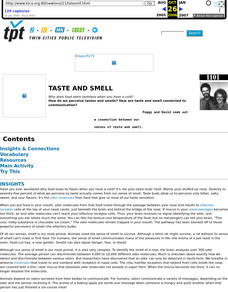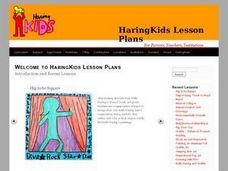Curated OER
Diffusion of Molecules
Students study the process for diffusion of molecules. In this chemistry lesson, students understand molecular movement, develop skills for a chemistry investigation, develop skills in making hypotheses, develop observational skills, and...
Curated OER
Milk: A Practical Application
Young scholars examine the impact of the physical and chemical properties of milk and its use as an important food.
Curated OER
Predator Prey Population Links
Fifth graders relate population of animals to its available food supply. They participate in an experiment and gather information. They use the data to draw conclusions.
Curated OER
Energy Defined
Fourth graders complete activities to study the sources of energy and forms. In this energy lesson, 4th graders discuss the origin of energy and define it. Students participate in several experiments to further study energy including a...
Curated OER
Erupting Volcano
Fourth graders watch teacher conduct the following experiment. Wearing safety goggles and old clothing is advised. The experiment could ruin clothing and hurt unprotected eyes. Follow the steps below having students write down what they...
Curated OER
Current Interactions
Learners design an experiment to see how wind, temperature, and salinity work together to influence ocean currents and present it in a report format. They explain to their classmates how experiment findings relate to ocean currents.
Curated OER
Balloon Lungs
Pupils study the function of lungs. In this lung function lesson, students complete an experiment using balloons to study the way lungs work. Pupils study a diagram of their lungs and make a hypothesis for their lung capacity experiment....
Curated OER
Exploring the Uses of Beaks
Students explore the uses of bird beaks in the wild by participating in experiment stations. In this bird adaptation lesson, students work in groups and complete experiment stations that represent different types of bird beaks. Students...
Curated OER
Taste and Smell
Students experiment to determine classmates taste and smell to find out which sends the clearest message to the brain.
Curated OER
Different Types of Orange Juice Contain the Same Amounts of Vitamin C?
Students measure and compare the amount of vitamin C in orange juice samples. They discover the effects of different factors on the concentration of vitamin C. They participate in an experiment to test the orange juice.
Curated OER
Endangered Spaces = Endangered Species!
Sixth graders discuss the crowding, loss of personal space, loss of home, loss of food, etc. that might occur at a developmental site. They witness, through an in-class demonstration, what happens when land is taken for development. They...
Curated OER
Chemistry: Plastic Milk
Students observe a basic chemical reaction as vinegar is mixed with skim milk and microwaved. First, they listen to the teacher read, "Little Miss Muffet," and discover the meaning of curds and whey. While the experiment have an...
Curated OER
Mixing Up Magic
Students explore the relationship between art and science through experimenting with color, design and recycled materials and creating their own art work.
Curated OER
Density Currents
Students experiment with currents caused by temperature variations that simulate the origins and flow of polar bottom currents. They discover water density is affected by temperature and salinity, resulting in deep water currents.
Curated OER
The Five Senses Kids Activities and Crafts
Pupils experience activities with their sense of smell. In this smell lesson, students hear a story about a bull who loves to smell flowers, pretend to be a dog smelling different smells, experiment with a smell test and paint with...
Curated OER
Laboratory - Density of a Material
Students conduct a lab (with water, guar gum and sodium borate) and carefully record physical and chemical properties and changes throughout the session, and experiment with weighing by difference.

















